How To Soundproof a Sliding Door? The Definitive Guide
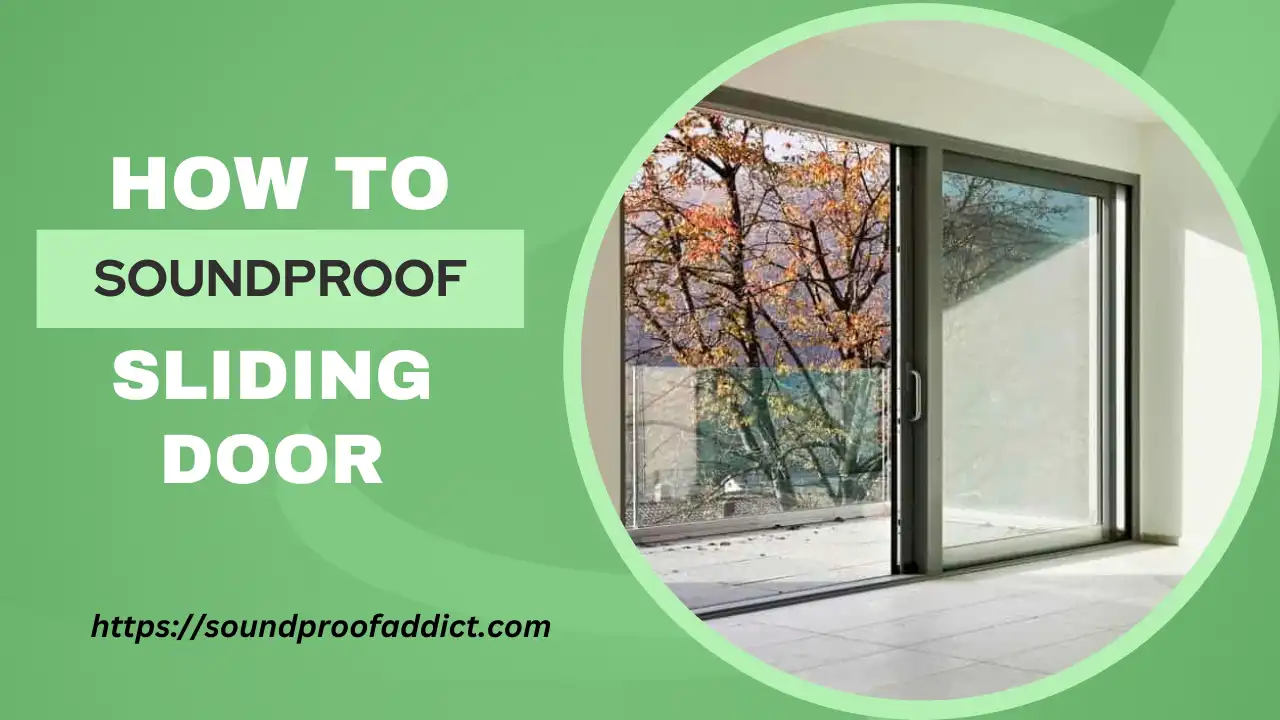
If you want to reduce the overall noise in your room, then you need to soundproof your doors, as a door is one of the biggest openings in a room. You already know this.
While soundproofing regular doors can be easy, but when it comes to soundproofing a sliding door, the job can be much more confusing and tricky. You may have already experienced it; that’s why you are here, right?
But anyway, to make it easy for you, I am going to give you the ultimate guide on how to effectively soundproof a sliding door on a low budget.
No matter if you are a beginner or have a little bit of experience in soundproofing, you can do it. So let me tell you how you can do it…
How to soundproof a sliding door?
Here are the easy-to-do DIY soundproofing techniques for sliding doors.
1: Replace old weatherstripping or install it
To soundproof your sliding door, one of the first steps you should take is to replace old weatherstripping if you already have it, or install it if you don’t have any.
I always do weather-stripping first when soundproofing any door and windows. Because it is important; it keeps the outside, outside, and the inside, inside – it’s that simple.
It prevents noise from the outside and prevents drafts from entering your home through the gaps on the sides, between the door frame and the door.
No matter how well you have installed your door, there might be some gaps, so installing weatherstripping should not be overlooked.
If you have old weatherstripping, replace it, as old strips can become ineffective over time and even become worn, which can allow sound to easily penetrate through the gaps between your sliding door and its frame.
2: Apply a brush door sweep
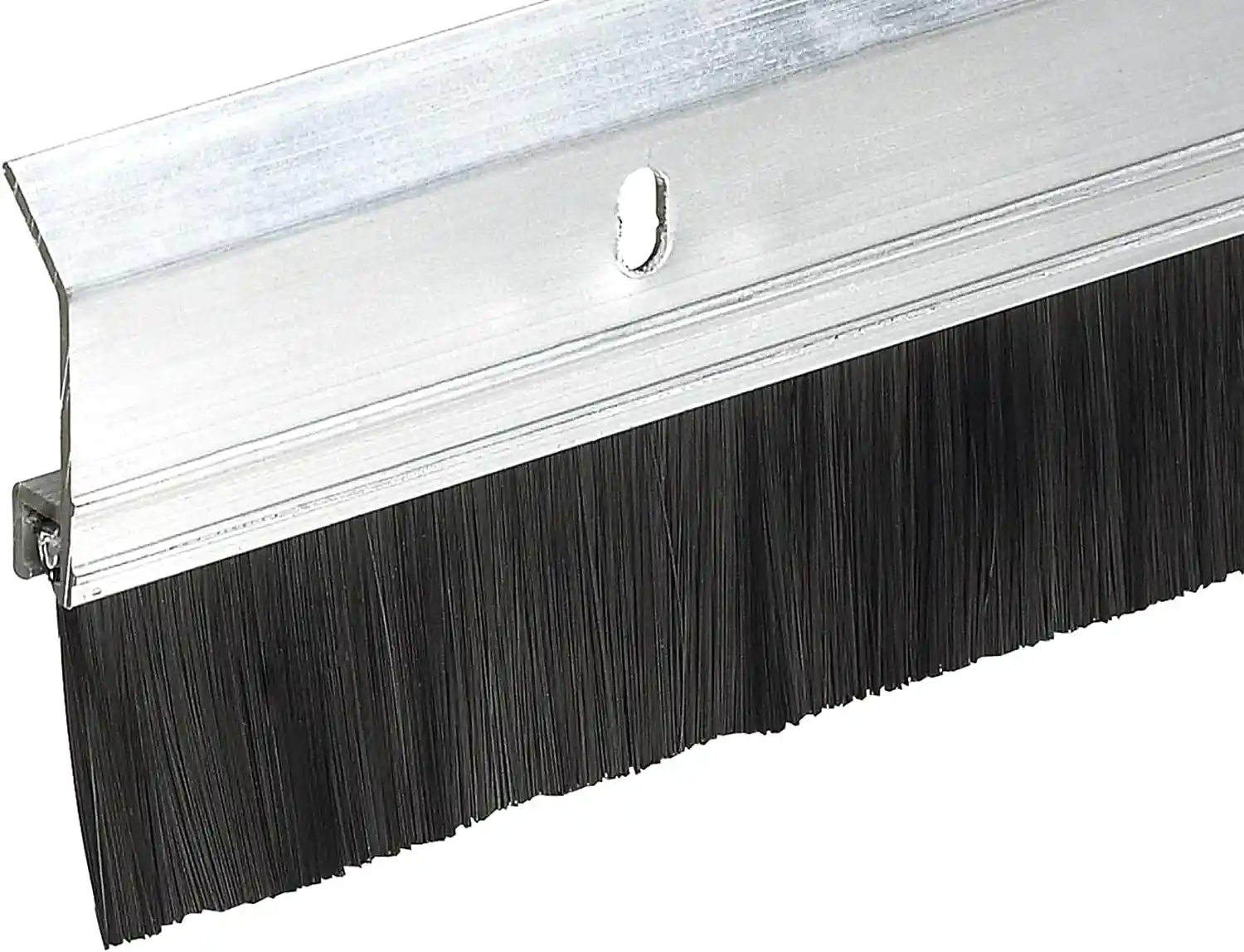
Installing a door sweep is just as important as weatherstripping. If you have gaps at the bottom of your door, then this simple yet effective method can make a significant difference in reducing noise.
It is basically a strip of material that is attached to the bottom edge of the door to create a seal for the gaps that your door has, which helps block out sound.
Now, there are many different types of door sweeps on the market, but the one you have to use is a brush one.
But, why choose a brush door sweep? Well, Unlike other door sweeps that might create a rigid barrier, brush door sweeps offer flexibility. The soft bristles of the brush sweep allow for easy movement when opening and closing the sliding door, while still providing a tight seal against noise without impeding the smooth movement of your door.
3: Seal the gaps around the door frame using acoustic caulk
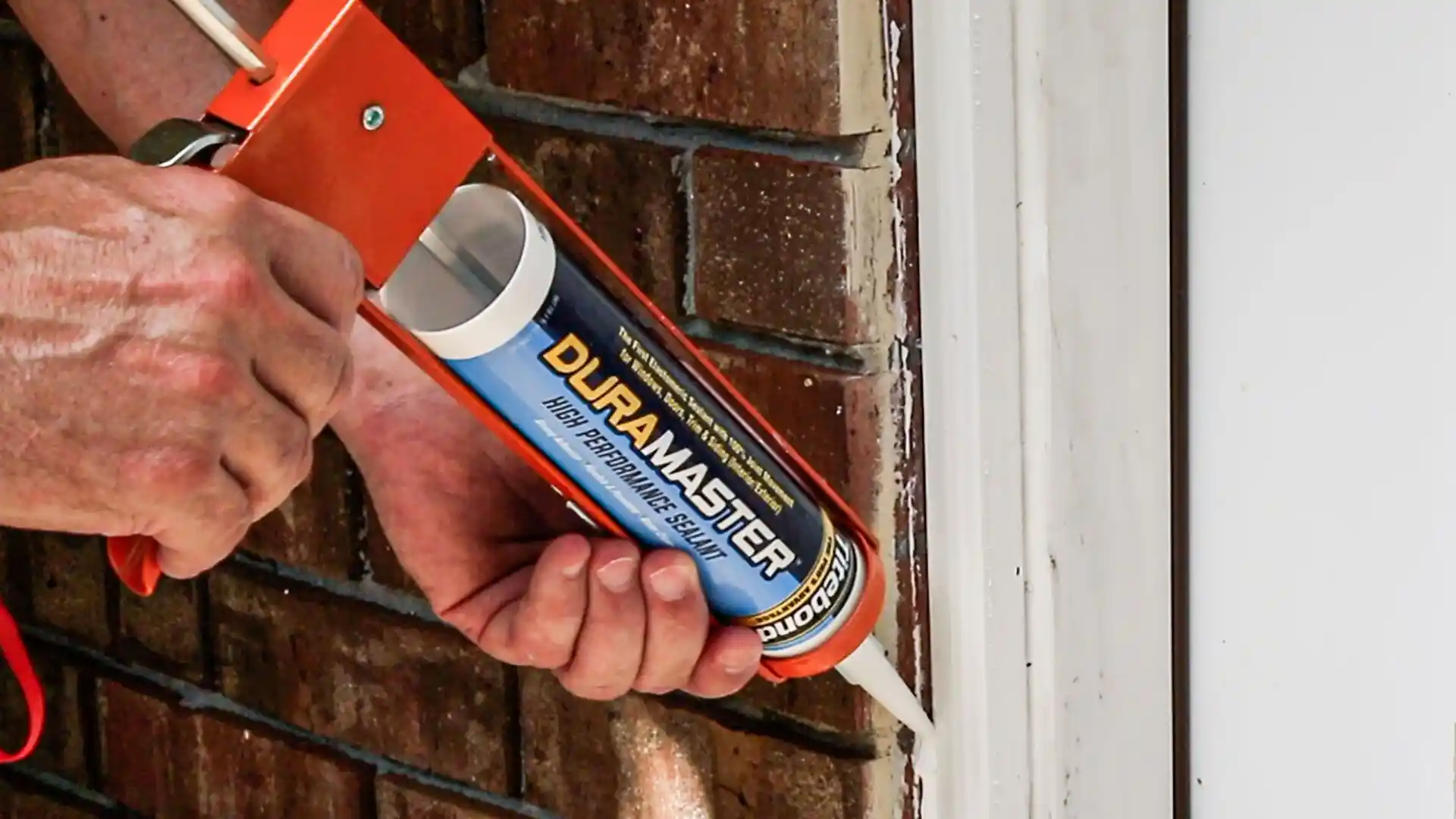
If you are soundproofing a door, then sealing all the gaps around your door frame completes 50% of the soundproofing process.
Seriously, these are the main reasons why sound gets through, so your aim should be to minimize the gaps as much as you can.
In sliding doors, gaps are usually present around the door frame and the wall. Take a look at that area, and you will notice small cracks around the perimeter of the door frame. If you see these gaps, use acoustic caulk to seal them up.
4: Install sound-absorbing curtains
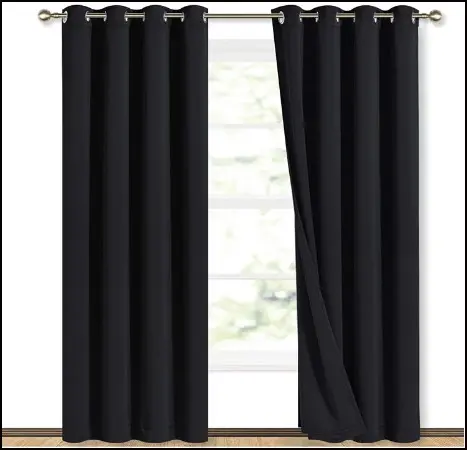
In my opinion, one of the best ways to reduce noise coming through an interior door is by using sound-absorbing curtains. Sound-absorbing curtains are an effective and stylish option for soundproofing a sliding door.
According to Residential-Acoustics, sound-absorbing curtains can reduce noise by between 21-25 dB, which is quite significant. The way these curtains work is by absorbing sound waves and reducing noise transmission.
To install these curtains, simply hang them on a curtain rod or track, just like you hang regular curtains. If you’re unsure about which curtain to choose which reduces the noise coming through your sliding door then check out our guide to the best sound-absorbing curtains.
5: Install a soundproof blanket
Another option similar to sound-absorbing curtains is to use sound-deadening blankets to soundproof a sliding door. While they are quite similar, they work a bit differently.
As mentioned previously, sound-absorbing curtains are made to absorb and soften sound waves when they hit the curtains’ surfaces. On the other hand, sound-deadening blankets, also known as acoustic blankets or soundproof blankets, are designed to deaden sound.
However, sound-deadening blankets are not as effective as sound-absorbing curtains. A YouTube channel named “Kennis Russel” found that sound-deadening blankets can reduce the noise level by up to 13.7 dB, which is effective but not as effective as curtains.
Installing a blanket is really easy – simply hang it over the door and secure it in place using hooks or Velcro. Make sure the blanket completely covers the door to be effective. (learn more)
However, if you’re soundproofing a sliding glass door, blankets might not be as practical. In that case, curtains could be a better choice for you.
In addition to soundproofing a sliding door with a blanket, you can soundproof blankets to quiet a condo door and it can also be used to increase the noise reduction capacities of hollow doors.
How to soundproof a sliding glass door with glass?
Soundproofing a sliding glass door with glass often requires specialized approaches due to the unique challenges glass presents for noise insulation.
Here are three effective methods that I found to be the most effective for soundproofing sliding glass doors:
- Sound-absorbing Curtains: Installing thick, heavy sound-absorbing curtains specifically designed for sound absorption is an effective and affordable way to soundproof sliding glass doors.
- I would recommend choosing 3 or more layers of curtains, as they are more effective than single-layer ones.
- Laminated Glass Replacement: If you are serious about reducing the noise coming through your sliding glass door, consider replacing its existing glass with laminated glass.
- Laminated glass consists of two layers of glass, making it harder for noise to pass through.
- However, it’s worth noting that replacing the glass with laminated ones can be quite costly.
- Acoustic Window Film: Applying an acoustic window film directly to the glass surface can enhance soundproofing capabilities.
- It improves the sound insulation properties of your sliding glass door without altering its appearance.
- Acoustic window film is an affordable option and can provide noticeable noise reduction.
How to soundproof sliding glass doors for recording studios?
To soundproof sliding glass doors for recording studios, consider replacing them with a triple pane glass door. This is by far the most effective and the best solution due to its superior noise reduction capabilities, there is really no better way.
As the name suggests, triple-pane glass doors consist of three layers of glass with insulating layers between them. This design dampens sound vibrations and minimizes noise transmission to a great extent.
In recording studios where pristine sound quality is essential, triple-pane glass doors offer exceptional soundproofing.
However, if you are a bit less budget you can think about installing double-pane glass doors; they are also highly effective.
How to soundproof a sliding barn door?
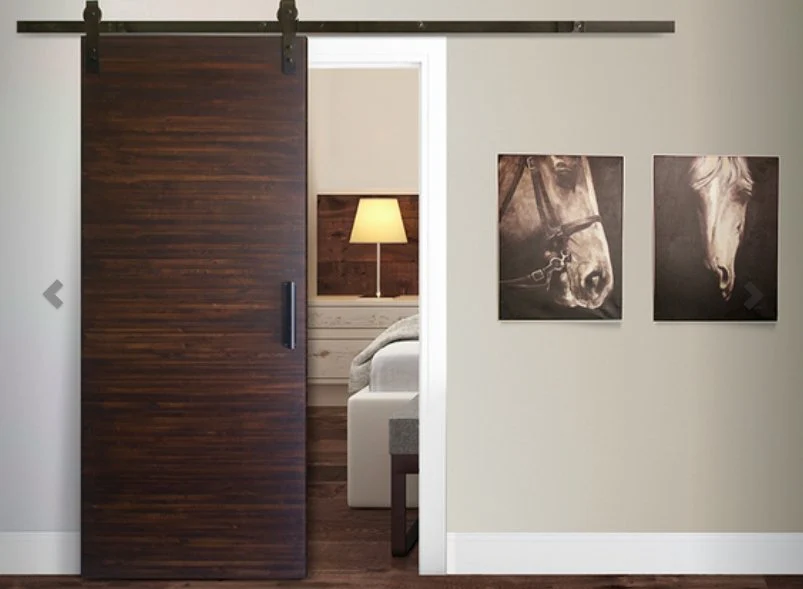
To be frank, soundproofing a sliding barn door demands a strategic approach that respects the door’s rustic charm while effectively reducing noise. Here are some tailored methods for soundproofing sliding barn doors based on my experience:
- Put Mass-Loaded Vinyl (MLV): If you have some knowledge about soundproofing, then I believe I don’t need to explain what mass-loaded vinyl is and how effective it can be.
- Installing Mass-Loaded Vinyl (MLV) on the surface of the barn door is a highly effective approach. MLV is an excellent option for barn doors due to its versatility and ease of installation.
- You can attach mass-loaded vinyl directly to your door’s surface by taking accurate measurements of your door and cutting the MLV to size.
- Acoustic Panels: Mounting acoustic panels on the barn door’s surface can improve its soundproofing. These panels are designed in a way to absorb sound and reduce their reflection.
- According to tests conducted by SoundproofStore found that acoustic panels absorb 90-100% of sound energy that hits them. If you are going to use this technique, then I would recommend you using Wood Perforated Acoustic Panels as they are much more effective than regular panels. It will be slightly expensive but the installation is definitely worth every penny.
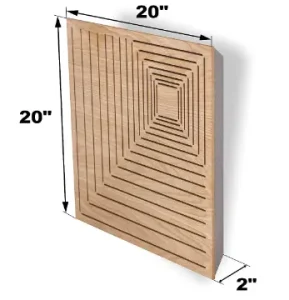
Read the full article to learn more about how to soundproof a sliding barn door.
How to soundproof aluminum sliding doors?
Aluminum sliding doors are lightweight and allow sound to travel through them very easily. This makes it a bit trickier to soundproof them. Nevertheless, to soundproof aluminum sliding doors installing 3-layer soundproofing curtains can be a go-to solution.
Curtains that are made up of 3-layers are designed with soundproofing in mind, and they are highly effective at absorbing high-frequency sound. Another great way to soundproof an aluminum sliding door is by attaching vibration isolation mounts to the aluminum frame.
This approach can be quite effective. These mounts absorb vibrations caused by sound waves and prevent them from resonating through the metal frame and into the room.
If you desire to further reduce the noise, you can try placing acoustic foam panels on the walls surrounding your aluminum sliding door.
Learn: How to acoustically insulate a bathroom door?
How to soundproof a cavity sliding door?
To soundproof a cavity sliding door effectively, seal all the gaps that your door has, this is super important and effective too. Any gaps in your door can be an entry point for the noise and this is what we do not want.
By applying weatherstripping tape and using acoustic caulk you can seal the gaps in your cavity sliding door easily. Another option you can use that I have mentioned a lot of times in this post is a soundproof curtain.
They are versatile, you can use them to soundproof any sliding door. Adding MLV layers to the door or cavity is also an excellent way to soundproof it.
How to soundproof a sliding French door?
To soundproof a sliding French door effectively, double glazing the door with laminated glass is a top choice, as it adds an extra layer of sound insulation due to the air space between the panes and the sound-dampening properties of the laminated material.
Applying weatherstripping and door sweeps to seal gaps are also great ways to prevent noise leakage. Soundproof curtains can be helpful for further enhancing noise reduction capacities.
How to soundproof a pocket sliding door?
In my opinion, the most effective method for soundproofing a pocket door is to attach a layer of mass-loaded vinyl (MLV) to it. The dense and flexible characteristics of MLV substantially block sound through the door.
You can use it by stapling it to the door’s surface. In addition, using acoustic blankets or curtains is also an effective approach. Sealing along the sides of the door using acoustic caulk to prevent sound leaks is crucial; you should not neglect it.
Related: Are bifold doors soundproof?
Final thought
In summary, soundproofing a sliding door might seem tricky, but with the techniques shared in this article, achieving a soundproofed sliding door is very possible even if you’re on a budget.
Starting with the basics, replacing old weatherstripping or installing it if you haven’t, is a foundational step and shouldn’t be overlooked. Adding a brush door sweep at the bottom of the door further seals off potential noise pathways.
For a more thorough solution, you can consider using sound-absorbing curtains or sound-deadening blankets. These work well to reduce noise effectively.
When it comes to soundproofing sliding glass doors, you have good options. Sound-absorbing curtains, laminated glass replacement, and acoustic window film are all solid choices to enhance sound insulation.
For sliding barn doors, methods like mass-loaded vinyl and acoustic panels are smart moves. They can really make a difference in keeping unwanted noise out.
Lastly, if you’re looking to soundproof aluminum sliding doors without breaking the bank, a three-layered soundproofing curtain is a good choice.
That’s it for this post: Soundproof a sliding door
Related: Garage door soundproofing
Recommended to read: How can I make my louvered door more soundproof?
And if you want to know the cost of a soundproof door then read the linked post.
